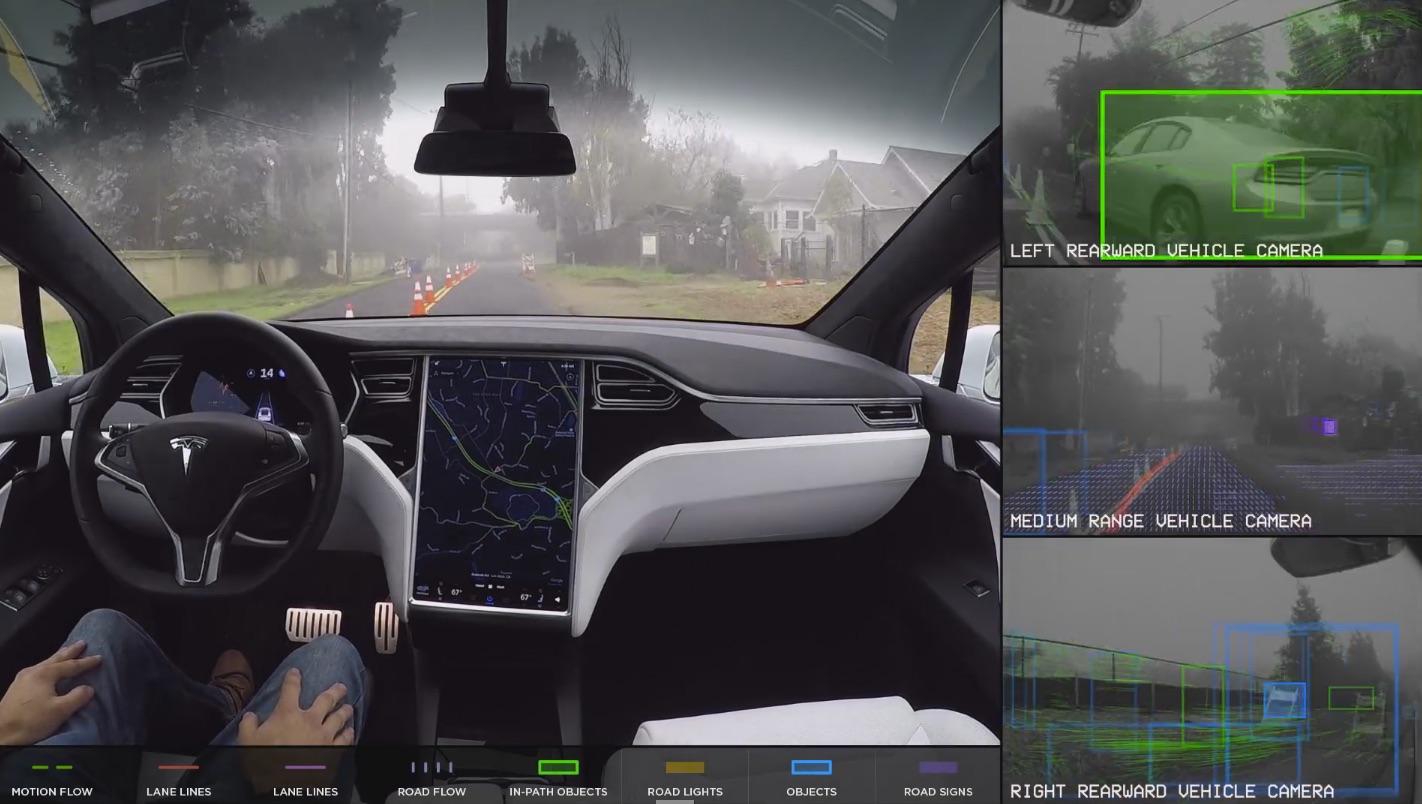

News
Netherlands ranks 1st in autonomous vehicle readiness, US places 3rd
The recently-released Automated Vehicles Readiness Index (AVRI) report by auditing firm KPMG has revealed that the Netherlands is the world’s most autonomous vehicle-ready country. The AVRI, which ranks nations across the globe according to their readiness for self-driving technologies, has also placed the United States in third place, right behind Singapore.
KPMG International evaluated countries according to four particular pillars. To make it to the index’s rankings, nations must perform well on policy and legislation, technology and innovation, infrastructure, and finally, consumer acceptance. The countries’ scores for each pillar are then aggregated and ranked.
Topping the list was the Netherlands, which was the clear world leader in the AVRI. The European nation ranked 1st in infrastructure, 2nd in consumer acceptance, 3rd in policy and legislation, and 4th in technology and innovation. The country’s aggregated score was 27.73 points, placing it well ahead of other nations in the index.
According to an EE Times report, the Netherlands’ impressive performance was attributed largely to its AV-friendly infrastructure. As of writing, the Netherlands boasts the highest density of electric vehicle charging points in the world. By 2016, the European nation already offered 26,789 charging points for the public. The country is also known for its well-maintained road network, which is currently rated as one of the world’s best.
In a statement to Geospatial World News, KPMG Netherlands Digital Advisory Manager Stijn de Groen noted that the country, even at this point, is already prepared for the upcoming autonomous vehicle revolution.
“The Dutch ecosystem for AVs is ready. The intensively-used Dutch roads are very well developed and maintained, and other indicators like telecoms infrastructure are also very strong. In addition, the Dutch government Ministry of Infrastructure has opened the public roads to large-scale tests with self-driving passenger cars and lorries,” the KPMG executive said, according to a GWN report.
AVRI’s second-placer on its rankings is Singapore, topping the list both in policy and legislation as well as consumer acceptance. According to KPMG, the Asian city-state received high marks in these pillars due to its recent amendment to its Road and Traffic Act, which allowed autonomous vehicles to be tested on public roads. Singaporeans were also found to be readily accepting of self-driving cars as a means of transportation.
Singapore also ranked 8th in technology and innovation and 2nd in infrastructure. The Asian city-state earned an aggregated score of 26.08 points.
The United States ranks third in the AVRI, despite ranking first in technology and innovation. Among all the countries in the index, the US earned near-maximum ratings on industry partnerships and research and development hubs, among other factors. The country’s overall score, however, was hampered by its low ratings on patents and overall usage of electric cars. The limited adoption and actual capabilities of fully autonomous vehicles also contributed to the country’s score.
Overall, the US ranked 7th in infrastructure, 10th in policy and legislation and 4th in consumer acceptance. The United States’ aggregated score in the AVRI is 24.75 points.
In a statement to GWN, KPMG US Infrastructure Advisory Principal Timothy D. Wilschetz noted that the country, while highly innovative in the autonomous vehicle sphere, still suffers from several setbacks. Wilschetz believes, however, that US regulators have the power to change this trend.
“The US has a highly innovative but largely disparate environment with little predictability regarding the uniform adoption of national standards for AVs. Therefore, the prospect of widespread driverless vehicles is unlikely in the near future. However, federal policy and regulatory guidance could certainly accelerate early adoption, particularly concerning limited freight applications such as truck platooning.”
Top 10 countries most prepared for the future of autonomous transportation by KPMG
- Netherlands
- Singapore
- United States
- Sweden
- United Kingdom
- Germany
- Canada
- United Arab Emirates
- New Zealand
- South Korea
News
Tesla Robotaxi has already surpassed Waymo in this key metric
Tesla Robotaxi has already overtaken Waymo in Austin in one key metric, but there’s still more work to do.

Tesla Robotaxi has already surpassed Waymo in one extremely important key metric: size of service area.
Tesla just expanded its service area in Austin on Monday morning, pushing the boundaries of its Robotaxi fleet in an interesting fashion with new capabilities to the north. Yes, we know what it looks like:
🚨 Tesla’s new Robotaxi geofence is…
Finish the sentence 🥸 pic.twitter.com/3bjhMqsRm5
— TESLARATI (@Teslarati) July 14, 2025
The expansion doubled Tesla Robotaxi’s potential travel locations, which now include the University of Texas at Austin, a school with over 53,000 students.
The doubling of the service area by Tesla has already made its travel area larger than Waymo’s, which launched driverless rides in October 2024. It became available to the public in March 2025.
According to Grok, the AI agent on X, Tesla Robotaxi’s current service area spans 42 square miles, which is five square miles larger than Waymo’s service area of 37 square miles.
Tesla Robotaxi (red) vs. Waymo geofence in Austin.
Much can be said about the shape… but the Robotaxi area is now ~3.9 mi² (10 km²) larger than Waymo’s!! pic.twitter.com/dVfh2ODxJC
— Robin (@xdNiBoR) July 14, 2025
The service area is one of the most important metrics in determining how much progress a self-driving ride-hailing service is making. Safety is the priority of any company operating a ride-hailing network, especially ones that are making it a point to use autonomy to deploy it.
However, these companies are essentially racing for a larger piece of the city or cities they are in. Waymo has expanded to several different regions around the United States, including Arizona and Los Angeles.
Tesla is attempting to do the same in the coming months as it has already filed paperwork in both California and Arizona to deploy its Robotaxi fleet in states across the U.S.
As the platform continues to show more prowess and accuracy in its operation, Tesla will begin to expand to new areas, eventually aiming for a global rollout of its self-driving service.
News
Tesla Megapacks arrive for massive battery replacing coal plant
Tesla Megapacks have started arriving on-site to the Stanwell Battery Project, just as Queensland prepares to wind down the Stanwell coal plant.
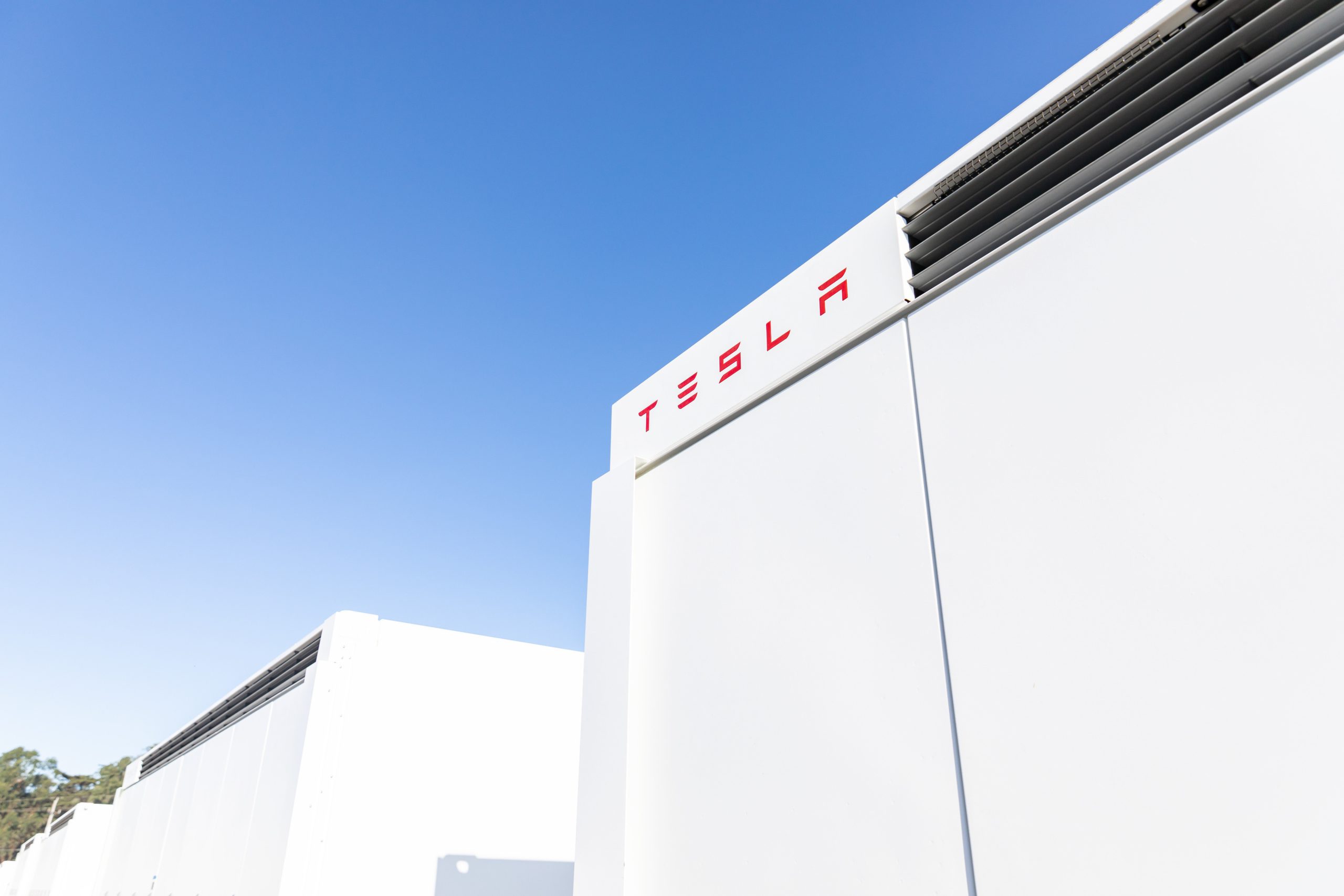
The first of over 300 Tesla Megapacks have arrived to the site of a massive battery energy storage system (BESS) being built in Australia, dubbed the Stanwell Battery Project after a coal plant it’s set to replace.
In a press release last week, the Stanwell Battery Project announced that the first Tesla Megapack 2XL units had arrived to the site, which is located outside of Rockhampton in Queensland, Australia. The project will eventually feature 324 Megapack units, set to arrive in the coming months, in order to support the 300MW/1,200MWh battery project.
“The Stanwell Battery is part of the diversification of our portfolio, to include cleaner and more flexible energy solutions,” said Angie Zahra, Stanwell Central Generation General Manager. “It is just one part of the 800 MW of battery energy storage capacity we have in our pipeline.
“Capable of discharging 300 MW of energy for up to four hours (1,200 MWh), our mega battery will be one of the largest in Queensland.”

Credit: Stanwell
Did you know Tesla’s Lathrop facility churns out a Megapack every 68 minutes? That’s enough energy to power 3,600 homes for an hour per unit! ⚡️ pic.twitter.com/bG6fpHkB9O
— TESLARATI (@Teslarati) June 11, 2025
READ MORE ON TESLA MEGAPACKS: Tesla Lathrop Megafactory celebrates massive Megapack battery milestone
The state is working with government-owned company Yurika to facilitate construction, and the process is expected to create roughly 80 jobs. The project is expected to come fully online in May 2027, with initial commissioning of the Megapacks aiming for November 2025.
The Stanwell Battery is set to replace the nearby Stanwell coal generation plant, which the government is planning to wind down starting in 2026 as part of efforts to reach an 80 percent renewable energy generation ratio by 2035. Meanwhile, the government is also set to begin winding down the Tarong and Callide coal plants, while several other Megapack projects are being built or coming online. o ya
Tesla currently has two Megapack production facilities, located in Lathrop, California, in the U.S. and another that came online earlier this year in Shanghai, China. The Shanghai Megafactory shipped its first units to Australia in March, while both factories are expected to be capable of producing 10,000 Megapack units per year upon reaching volume production.
News
The Tesla Diner is basically finished—here’s what it looks like
The company first broke ground on the Diner, Drive-in, and Supercharger location in September 2023. Now, it has served one of its first internal customers.

Tesla has finally completed the construction of its highly anticipated Diner, Drive-in, and Supercharger in Los Angeles, and recent photos of the interior’s “retro-futuristic” style are making their way around the internet.
X user Brad Goldberg shared photos from the Tesla Diner site last Tuesday, depicting some of the Supercharger stalls, indoor and outdoor seating areas, multiple neon lights, and even an Optimus robot. Goldberg also noted that there had been a “flurry of activity on site” while he was snapping the photos last week, suggesting that the restaurant location could be getting close to opening.
The Tesla Diner also served one of its first internal customers in the past few days, as Elon Musk posted on X on early Monday morning that he had just finished up eating a meal at the site:
I just had dinner at the retro-futuristic Tesla diner and Supercharger.
Team did great work making it one of the coolest spots in LA!
The photos also show that the site is pretty much done, with some of them even showing vehicles charging at the charging stalls.
You can see some of the latest photos of the Tesla Diner below.

Credit: BradGoldbergMD | X
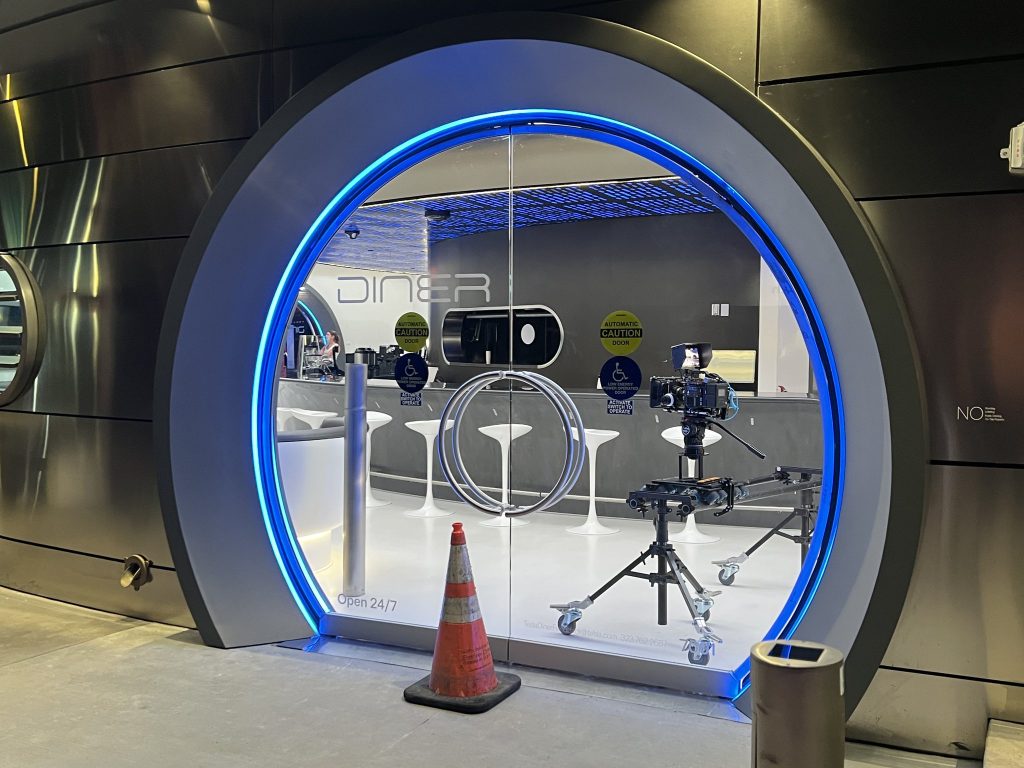
Credit: BradGoldbergMD | X

Credit: BradGoldbergMD | X
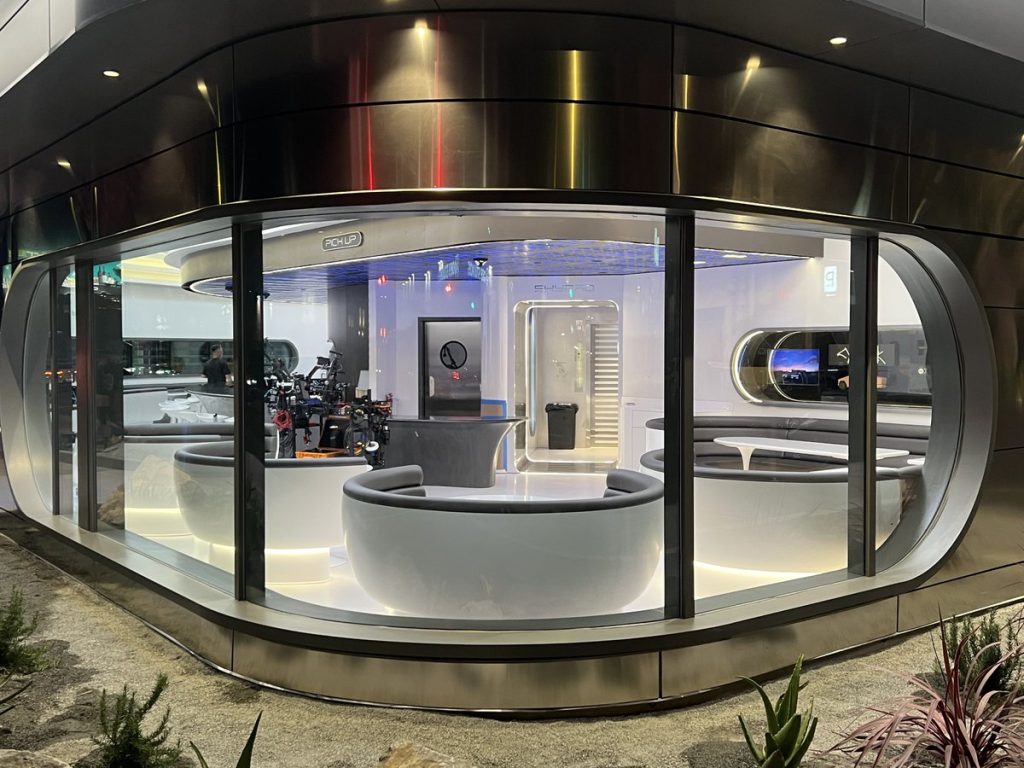
Credit: BradGoldbergMD | X

Credit: TeslaKing420 | X

Credit: TeslaKing420 | X
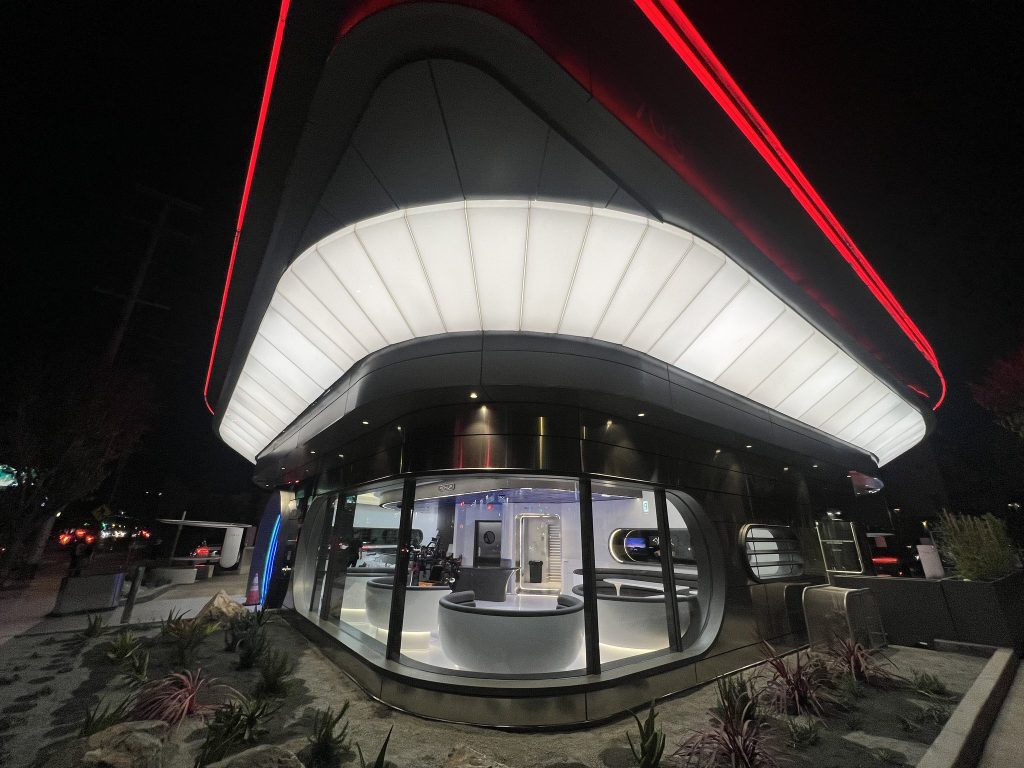
Credit: Brad Goldberg (via Sawyer Merritt on X)

Credit: Brad Goldberg (via Sawyer Merritt on X)

Credit: Brad Goldberg (via Sawyer Merritt on X)

Credit: Brad Goldberg (via Sawyer Merritt on X)

Credit: Brad Goldberg (via Sawyer Merritt on X)
READ MORE ON TESLA’S LA DINER: Tesla readies Drive-In Diner Supercharger for launch with app inclusion
When will the Tesla Diner open to external customers?
While it’s still not open to external customers yet, the news again suggests that the company could be close to an official opening date. Tesla first broke ground on the Diner in September 2023, after receiving a wave of building permit approvals throughout that year. Teslarati also covered much of the construction progress throughout last year, including when crews installed the first and second drive-in screens.
Located at 7001 West Santa Monica Boulevard, the idea was first discussed in 2018 by Musk and a few others on Twitter, featuring 1950s rock and roll, waiters on roller skates, and drive-in movie theater screens playing clips from some of history’s best movies. Notably, the photos of the front doors also show that the site will be open 24 hours a day, 7 days a week, whenever it does end up opening.
Tesla’s progress on Supercharger with diner, drive-in seen in aerial footage
-

 Elon Musk2 weeks ago
Elon Musk2 weeks agoTesla investors will be shocked by Jim Cramer’s latest assessment
-

 News2 days ago
News2 days agoTesla debuts hands-free Grok AI with update 2025.26: What you need to know
-

 Elon Musk4 days ago
Elon Musk4 days agoxAI launches Grok 4 with new $300/month SuperGrok Heavy subscription
-

 Elon Musk7 days ago
Elon Musk7 days agoElon Musk confirms Grok 4 launch on July 9 with livestream event
-

 News1 week ago
News1 week agoTesla Model 3 ranks as the safest new car in Europe for 2025, per Euro NCAP tests
-

 Elon Musk2 weeks ago
Elon Musk2 weeks agoxAI’s Memphis data center receives air permit despite community criticism
-

 News4 days ago
News4 days agoTesla begins Robotaxi certification push in Arizona: report
-

 Elon Musk2 weeks ago
Elon Musk2 weeks agoTesla scrambles after Musk sidekick exit, CEO takes over sales














